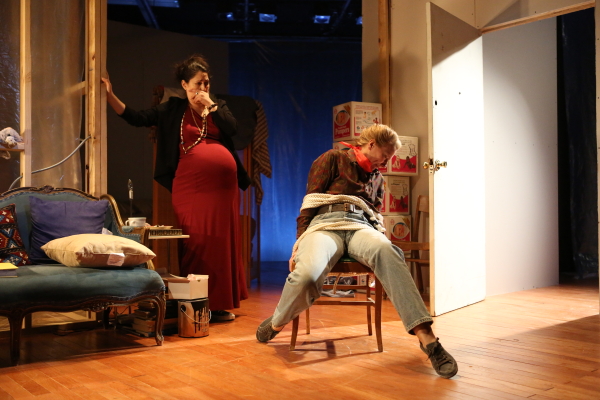And Baby Makes Seven

(© Steven Schreiber)
Gay parents are no longer a controversial subject in America. Once network television started making sitcoms about households headed by same-sex couples, as a nation we broke a cultural barrier, never to be unbroken. Yet in 1984 when Paula Vogel first premiered And Baby Makes Seven, attitudes about LGBT people (not to mention the unthinkable prospect of gay parents) were very different; the play was met with much homophobic derision. Thirty years later, Purpleman Theater in association with New Ohio Theatre offers a revival of this tale of gay adults with overactive childlike imaginations on the precipice of parenthood that is unlikely to make anyone feel squeamish…with the possible exception of a few executives at the Human Rights Campaign.
Watching Vogel's play in 2014 is kind of like watching Back to the Future Part II today: Vogel's vision of the future of the American gay family is quite different from how things actually turned out. It's fascinating to consider those differences. "I wrote this play in the twentieth century, when I still had the energy to envision a sexual utopia," Vogel said in a press statement. Her pansexual threesome is a far cry from the gay families we see on television shows like Modern Family and The New Normal.
Peter (Ken Barnett) is a gay(ish) man who lives in Koch-era New York City with lesbian couple Anna (Constance Zaytoun) and Ruth (Susan Bott). Anna is pregnant with Peter's baby. (This was before modern science made surrogacy possible; so yes, they had sex…several times.) The three plan to raise the child together as a family, but first they have to contend with Anna and Ruth's three imaginary children. Anna often pretends to be a 9-year-old prodigy named "Cecil", while Ruth takes on the dueling personalities of "Orphan" (who was raised by stray dogs in the Port Authority Bus Terminal) and "Henri" (the little French boy from Albert Lamorisse's Academy Award-winning film The Red Balloon). Cecil, Henri, and Orphan bicker and raise hell, like all under-10 boys are wont to do, generally driving their Uncle Peter crazy. In fact, Peter thinks it would be a good idea to stop indulging in these fantasies before their real child arrives. In response, Anna and Ruth decide to kill off their make-believe brood, an activity that proves more difficult than any of them expected.
Sensitively designed by Brett J. Banakis, the apartment is overrun by plastic sheets and construction equipment, suggesting a major renovation not only in the physical space, but in the way these three people conduct their lives. They're about to add a fourth roommate, one that needs their undivided love and attention. Director Marc Stuart Weitz tracks this change of time and circumstance by gradually removing the sheets and finishing the apartment as the play proceeds.
This sure-footed approach is matched by incredibly committed performances from the three actors. Their imaginary child roles seem as real as their adult ones. Bott delivers a tour de force in a fight scene between Orphan and Henri, her limbs flailing and throwing punches as if she were actually possessed by a demonic 7-year-old.
Outside observers might conclude that these people are emotionally unstable; at very least, they're mentally stunted. (Although, a stack of academic books on the intricacies of New York City politics sitting near the sofa suggests the opposite.) When Anna, Ruth, and Peter engage in three-way sex, it's a settled matter: These are decidedly not the just-like-you finicky gay parents we've seen on TV. These people still exist on the sexual and cultural fringe.
All of this makes And Baby Makes Seven a delightful and worthwhile night in the theater, a reminder of a time when gay people weren't so obsessed with the need to fit in. While the avant-garde of post-Stonewall gay life is so often depicted by bathhouses and circuit parties (male activities), Vogel wisely centers her story on a lesbian couple who has their own eccentric (perhaps less-dangerous) adult activities. While their Shakespeare-quoting imaginary kids can be quite annoying at first, we come to appreciate this affectation as a part of Anna and Ruth's unique charm. It makes them special. It's also the sacrifice they must make as they strive toward becoming a "normal" (or "equal", if you like) family.
Weitz's production succeeds in bringing real stakes to the deaths of Orphan, Cecil, and Henri. We mourn their loss, along with Peter, Anna, and Ruth. Certainly LGBT rights have made huge gains in the last three decades. And Baby Makes Seven urges us that, in observing that fact we should also stop and ask ourselves, "What has been lost?"











